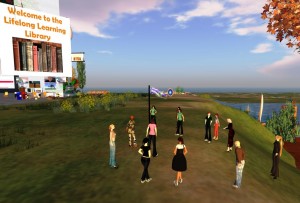A colleague sent an email expressing concern over posts criticizing librarians for “still being involved in Second Life“.
I replied by email and she suggested I share.
I wrote:
“The ability to “fly” in virtual worlds? That’s nothing! A generation of video gamers now considers gaming a literary genre (and many are cinematic and well-researched). Virtual worlds are not video games- but this evolution of literacy changes everything. The argument that the majority of mainstream culture uses Facebook is ridiculous. The majority of mainstream culture also values convenience over quality, triviality over authority or accuracy, and self-absorbed “packaging” of our personal lives over anything meaningful.
This conversation is not about Second Life, but about virtual worlds….and they are not going away. My physical library is only half of what I do. We all have both physical and virtual lives (after the digital revolution and the toppling of the information hierarchy). The question is whether to spend my virtual life in a flat, narcissistic, space where popular culture and cute photos are streamed nonstop or seek out interesting, intelligent people on a global scale who can help me move toward a better future for this post-physical world. You all understand that…..and that is enough for me.”
Yes, I also read Roy Tennant’s blogpost when ALA closed an island in Second Life. I did not reply, mainly out of respect for this esteemed colleague. I have credited Roy Tennant as the first library professional that I heard state that in our information world today, “convenience trumps quality”. His statement was a turning point for me. I began to see a different kind of information-seeking behavior in my physical library. I began to actively explore digital literacy and changing formats.
I understand that SL is not the “be all end all” of education or libraries. Virtual worlds are just one piece of information literacy. I am humbled by the amazing colleagues I have worked with in virtual worlds and I am proud of the huge amount of effort it took to earn a PhD on the topic (not to boast because I understand I am just one small person contributing one tiny piece of the research on the future of information literacy). I have worked very hard to understand how to separate my “personal” perspective from my professional contribution to my field. My experience includes organizing five virtual world exhibits, numerous presentations, discussions, learning machinima, and networking on a global scale. I could not have accomplished any of those experiences in my physical library- even through using webinars and other distance learning tools (of which I am familiar). Second Life is only one company, which happened to provide a great array of tools for early adopters of virtual worlds. Having explored many other virtual worlds, for many other purposes (business, military, medicine, and so on), I certainly am not attached to one in particular. Slamming Second Life is not offensive to me, but putting down librarians?! Whew…don’t get me started.
For more information on my dissertation topic, I will be presenting an overview on Nov. 18th in Second Life. For information on other virtual worlds, contact me. Meanwhile, I return to my awesome physical library where I struggle to teach critical inquiry to students who want to play apps and interact on mobile devices.





